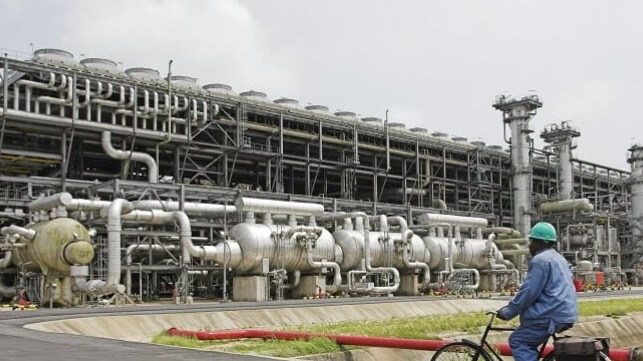Nigeria LNG Terminal Declares Force Majeure Due to Flooded Gas Fields

Nigeria's severe flooding has temporarily forced the closure of the Nigeria LNG export terminal at Bonny Island, cutting off 22 million tonnes per annum of production capacity in a tight global market.
All of the plant's upstream gas suppliers have declared force majeure. High flood water levels in gas production areas have led to shut-ins, triggering a loss of flow to the terminal. With no gas to liquefy, NLNG has activated its contractual force majeure clauses.
"NLNG is currently reviewing the situation with gas suppliers to ascertain the extent of the disruption to its operations but would, as a reasonable and prudent operator, endeavour to mitigate the impact of the force majeure to the extent reasonably possible," said ?Andy Odeh, the plant's general manager for external relations.
NLNG was developed to monetize the vast quantities of flared gas from the Niger Delta oilfields. It is investing in another liquefaction train to expand its capacity to 30 mtpa, taking advantage of high and growing demand for LNG. It primarily supplies Portuguese gas company Galp Energia.
The flooding that has taken out the plant's gas supply network has devastated large swathes of Nigeria, killing hundreds and forcing more than a million people to flee their homes. 33 out of 36 states have been affected, including most recently the states of the Niger River delta. The floods have destroyed crops in the country's northern breadbasket farming regions, an area which has already been affected by conflict and terrorism in recent years.

that matters most
Get the latest maritime news delivered to your inbox daily.
The shutdown at NLNG adds to the financial issues facing the government of Nigeria, which is heavily reliant on petroleum revenues. The country's oil exports have plummeted due to rampant and increasing oil theft. In September, Nigerian oil exports dropped below one million barrels per day, the lowest levels seen since the 1980s.
Nigeria's national oil corporation says that it is working hard to crack down on organized oil theft, which is enabled by corruption and has plagued the country for decades. A recent enforcement campaign discovered a theft pipeline running directly out to sea, designed to enable covert loadings of stolen crude.
